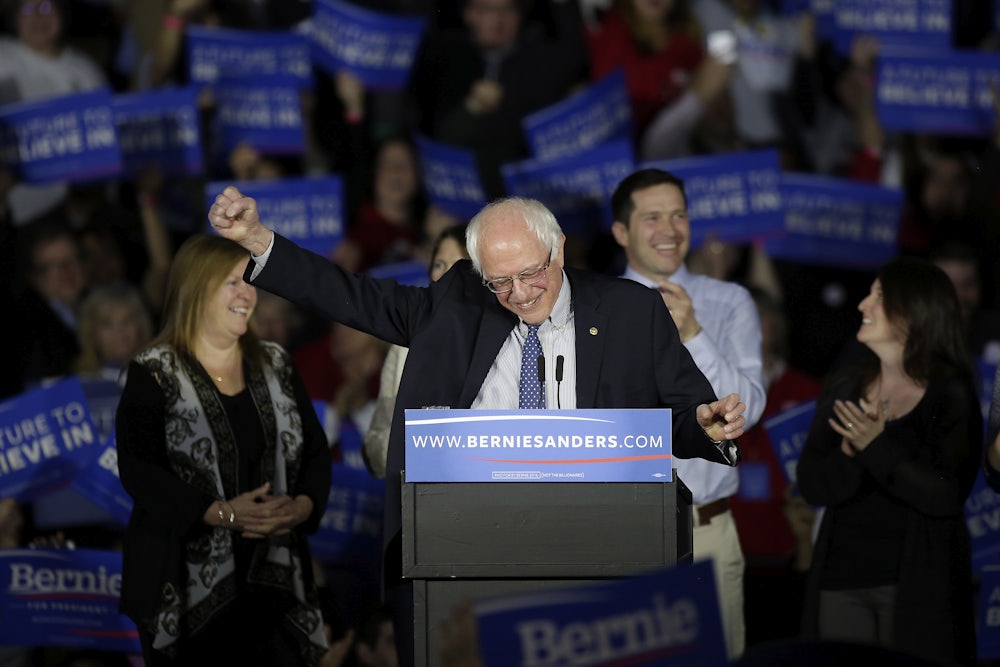Iowa could have been the place where the future of the Democratic presidential race was decided. If Hillary Clinton had won a decisive victory in Monday’s caucuses, she would have relegated rival Bernie Sanders to being an also-ran, a symbolic candidate who excited voters but couldn’t seize control of the party. Conversely, if Sanders had won, he would have given a bolt of energy to his insurgent campaign and had a chance to win over constituencies that still doubt him, especially non-white voters in key primary states like South Carolina.
But the actual outcome was unsatisfying to both sides: The vote was split almost down the middle, with only a fractional difference between the two candidates. The only thing that was settled Monday night was the fate of Martin O’Malley, who is now dropping out. Yet if the night was muddy and unclear in terms of its electoral meaning, it did show the ideological direction of the party in very forthright terms: Sanders is winning the battle of ideas and tugging Clinton to the left.
How do the two candidates respond to a caucus night that left everything profoundly uncertain? Both Clinton and Sanders tried to claim a moral victory and establish themselves as the leaders of the party. In her speech, Clinton pointedly did not claim victory, but offered a “sigh of relief.” She also pointedly described herself as “a progressive” and welcomed future debate with Sanders on the issues.
“It is rare that we have the opportunity we do now to have a real contest of ideas,” Clinton said. “To really think hard about what the Democratic Party stands for and what we want the future to look like.” The thrust of her speech was to reassure wavering and possibly Sanders-leaning Democrats that she shared their “progressive” vision and was the most effective advocate for it.
These moves were aimed at healing the ideological rift in the party, and assuaging Sanders supporters’ worries that she was pivoting to the center. The same message could be heard in Clinton’s claim that she would stand up for “women’s rights, gay rights, immigrant rights, and workers rights.”
If Clinton gave a semi-victory speech, Sanders also staked out a claim to have won Iowa. In reiterating his familiar critique of the way money is corrupting the political system and calling attention to the plight of the working and middle class, Sanders exuded a confidence that his message was resonating.
“What Iowa has begun tonight is a political revolution,” Sanders argued in his ringing conclusion. “A political revolution that says when millions of people come together, including those who’ve given up on the political process, they’re so dismayed and so frustrated with what goes on in Washington, with young people who before had never been involved in the political process, when young people and working people and seniors begin to stand up and say loudly and clearly, enough is enough, that our government, the government of our great country belongs to all of us and not just a handful of billionaires—when that happens we will transform this country.”
In the wake of Iowa, the Democrats are still a house divided almost down the middle. Yet ideologically, the direction of the party is clear: The resilience of Sanders’s movement is pulling the Democrats in a progressive direction. Without the challenge of Sanders, Clinton might be pivoting toward the center in preparation for the general election. Certainly Clinton has made gestures in that direction. But Sanders has shown that his message has a passionate audience in the party, which is creating a center of gravity that is tugging Hillary Clinton to the left.
Clinton is still the likely winner of the nomination, but the party she is trying to unite behind her is being transformed by Sanders. That, as the final delegate counts trickle in, is the legacy of Monday night’s vote.
